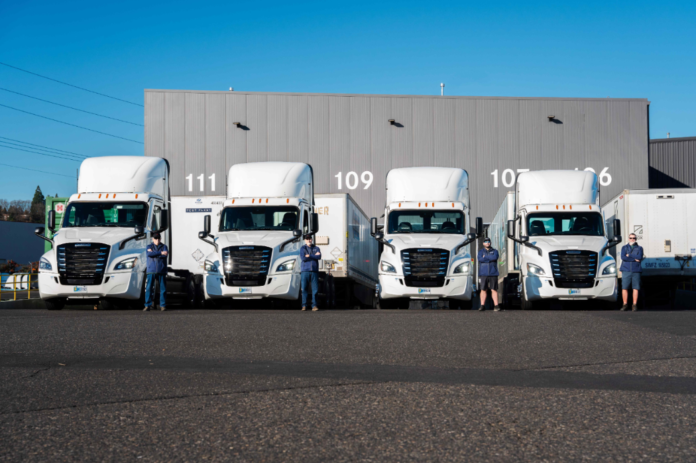Daimler Truck North America LLC (DTNA) says it is starting to integrate battery electric trucks into its own logistics operations. The company will rely on its Freightliner eCascadia battery electric semi-trucks, which were successfully launched in 2022 and have been available for customers since then.
Deployment of the eCascadia trucks in DTNA’s inbound logistics network demonstrates their potential within the company’s own fleet. To address infrastructure challenges, DTNA will utilize “Electric Island,” the first-of-its-kind heavy-duty electric truck charging site, which opened in 2021 in Portland, Ore. This site was designed to accelerate the development, testing and deployment of zero-emission commercial vehicles and provides the necessary infrastructure to support the company’s sustainable logistics vision.
The four electric vehicles that DTNA will initially deploy seamlessly integrate into DTNA’s logistics network, ultimately supporting the company’s production and aftermarket operations across North America. These vehicles will be used to pick up parts from various supplier locations in the Pacific Northwest and deliver them to DTNA’s consolidation center in Portland. From this consolidation center, the parts are then shipped to DTNA’s North American manufacturing plants and aftermarket parts distribution centers, serving customers across the United States and Canada.
“By integrating electric trucks into our inbound logistics network, we aim to reduce our environmental impact and contribute to a more sustainable future that goes beyond truck development and manufacturing,” says Jeff Allen, senior vice president, operations and specialty vehicles of DTNA. “Sustainability is a cornerstone of our corporate governance. We take the associated responsibility for our employees, for the environment and for society as a whole very seriously.”
The integration of electric vehicles into DTNA’s inbound logistics network is one of many sustainability initiatives that DTNA has undertaken. In 2020, the Portland truck manufacturing plant, where the eCascadia is built, achieved carbon-neutral production with reduced energy consumption and the offset of on-site emissions. DTNA further plans to incorporate carbon-neutral production at all its remaining truck manufacturing plants by 2025. Moreover, the firm is actively developing solutions to optimize the entire lifecycle of batteries used in its electric trucks, including remanufacturing, repurposing and end-of-life recycling.





